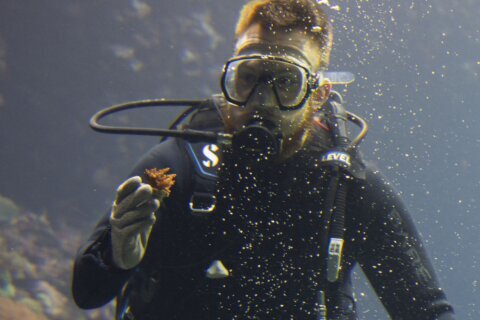BERLIN (AP) — Former German Chancellor Angela Merkel on Thursday defended her government’s decisions to buy large quantities of natural gas from Russia, which was her country’s primary gas supplier when she left office.
Speaking in Lisbon, Merkel said that “you always act in the time you are in” and that she doesn’t regret her decisions. She said that it was clear that Germany needed to diversify its energy supplies as it moved away from nuclear and coal-fueled power generation and that gas would be needed during that transitional period.
Merkel said that “from the perspective of that time, it was very rational and understandable to get pipeline gas, including from Russia, that was cheaper than LNG from other parts of the world.”
She added that “even in the Cold War, Russia was a reliable energy supplier.”
Merkel led Germany from 2005 until last December. During her time in power, the Nord Stream 1 pipeline bringing gas directly from Russia to Germany under the Baltic Sea came on stream.
Her government also backed the parallel Nord Stream 2 pipeline, despite strong opposition from central and eastern European countries and the United States. It never entered service because current Chancellor Olaf Scholz halted its certification process shortly before Russia invaded Ukraine in February.
“This brutal attack by Russia has brought a change; it’s a turning point, and the new government of course has to deal with that and it is doing so,” Merkel said.
Germany worked to reduce its dependence on Russian gas following the invasion, while Russia in turn cut supplies to Germany through Nord Stream 1 in June. Moscow cited technical problems that German officials dismissed as cover for a political move. Russia ended the flow of gas through the pipeline altogether at the end of August.
Merkel, who hasn’t made many public appearances since leaving office, has already defended her attempts as chancellor to bring about a diplomatic solution to tensions between Russia and Ukraine.
On Thursday, she made clear she stood by her 2011 decision to phase out Germany’s use of nuclear power at the end of this year, Merkel would not comment on an ongoing debate in Scholz’s coalition over whether and how much longer the remaining reactors should be kept online.
A new report published this week by the Center for Research on Energy and Clean Air found the number of new wind power facilities installed in Germany dropped sharply after 2015, during Merkel’s third term.
Had Germany kept building wind turbines at the rate other European countries did, installed capacity would have been 32 Gigawatts higher by the end of last year, the Finland-based think tank said. This would have significantly reduced Germany’s reliance on gas and nuclear power, it said.
___
Follow AP’s coverage of climate issues: https://apnews.com/hub/climate-and-environment
Copyright © 2024 The Associated Press. All rights reserved. This material may not be published, broadcast, written or redistributed.






